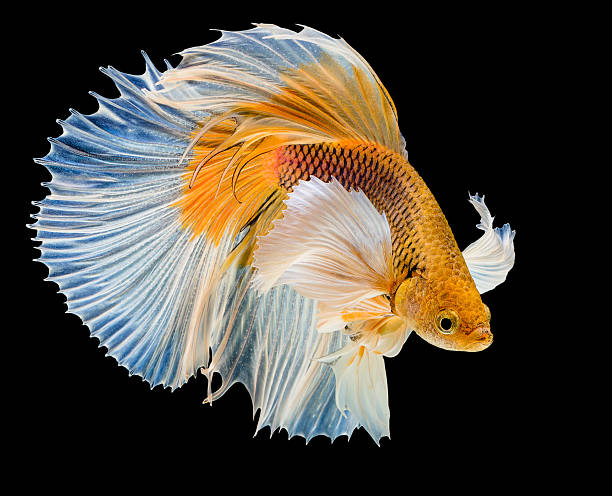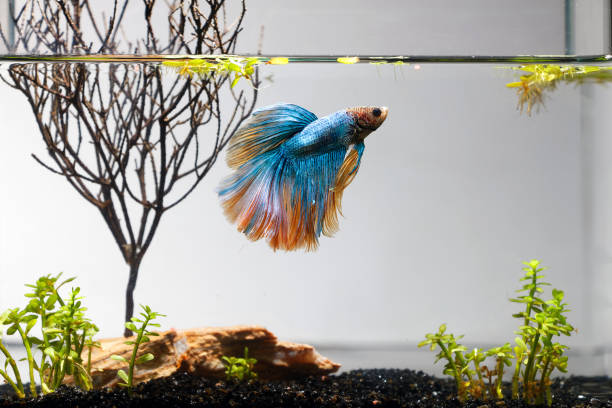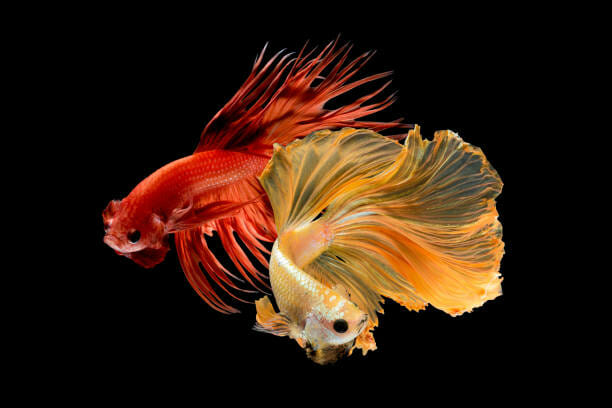How Do You Know When a Betta Fish Is Going to Die?
Betta fish are often kept in aquariums as a pet. They are generally considered to be hardy fish and can live in a wide range of water conditions, including moderately hard water. However, they do need some specific care and should not be kept with other aggressive fish and they can live up to six years in captivity.
It is not always easy to tell when a betta fish is going to die. Some betta fish may simply stop eating or show other signs of illness. Other betta fish may start to lose weight or their color may change. In some cases, betta fish may become paralyzed or die from a build-up of toxins in their body. Ultimately, it is up to the individual owner to decide when a betta fish should be euthanized.

Table of Contents
Common Signs of Dying Betta Fish
Lethargy
Betta fish that are lethargic may be sick or injured. If you notice your betta fish is not eating or showing any other signs of life, it is important to take them to a vet as soon as possible.
Less Activity
Betta fish are often kept in small tanks with no room to swim. When a betta fish stops swimming, it may be a sign that it is sick or injured and should be removed from the tank. If the fish doesn’t start swimming again after a few days, it may be time to euthanize it.
Appetite Loss
When a betta fish loses its appetite, it is usually a sign that it is sick or injured. If a betta fish has stopped eating and its body is showing signs of illness, it should be taken to a vet as soon as possible. If a betta fish is not eating and seems to be in good health, it may simply be losing interest in food.
Discoloration
Betta fish are tropical fish and as a result, they are susceptible to various diseases. One of the diseases that can affect betta fish is fading colors. This is when the colors of the fish start to fade and look less vibrant. This can be a sign that the betta fish is sick and should be treated accordingly. If the colors start to fade rapidly, then it is likely that the betta fish is dying.
Difficult Breathing
Betta fish breathe with gills on their head. When a betta fish breathes heavily, it may be a sign that it is sick or injured. If the breathing becomes labored and the betta fish starts to lose color, it should be taken to a vet as soon as possible.
Weight Loss
When your betta fish loses weight, you need to take the needed actions. Granted that beta fish rarely lose weight but if they do it’s not a good sign at all. If a betta has stopped eating and is showing signs of anemia (fatigue); It might be time to euthanize the fish so that a cure can be sought out as fast as possible.
Improper Posture
Betta fish have a curved spine that can make them difficult to care for. If your betta fish has a curved spine, it is likely that it is in pain and will die soon. If you notice that your betta fish has a curved spine, do not try to fix it. Instead, take your fish to a veterinarian as soon as possible.
Physical Changes
When a betta fish is going to die, you can usually tell by the scales and fins. A betta fish with scales that are dry and brittle, or fins that are curled and shriveled, is likely to die soon.
Glassy Eyes
Betta fish can develop glassy eyes as a result of disease or injury. This is a sign that the fish is in trouble and should be treated as such. If the fish has glassy eyes and is not eating or swimming, it should be euthanized.

Common Reasons for Betta Fish Deaths
- Water Quality Issues: Betta fish are tropical fish that thrive in warm water. However, if the water in which they live is not properly maintained, betta fish can develop water condition issues. These issues can include an inability to swim or breathe properly, a decrease in appetite, and even death. When water conditions are not properly maintained, it is important to take steps to rectify the issue as soon as possible.
- Overfeeding: There are a few things you can do to help prevent your betta fish from dying as a result of overfeeding. First, always make sure that the food you are providing your fish is fresh and of the right size. Second, be sure to give your fish enough space – they need enough room to swim and feed. And finally, don’t overfeed your fish – give them only enough food to sustain them and make sure they are getting enough water too. If you follow these tips, you should be able to keep your betta fish healthy and happy.
- Stress: There is no one answer to this question as every betta fish is different, but some general indicators of when a betta fish may be in danger of dying from stress include decreased appetite, increased swimming or circling behavior, and changes in color or pattern. If any of these signs are present, it is important to take the fish to a vet as soon as possible for a diagnosis and treatment.
- Injuries: When a betta fish is injured, it can often be difficult to tell if the fish is going to survive. Many times, a fish that appears to be injured will recover and live a normal lifespan. However, there are occasions where a betta fish will die as a result of its injury.
If you notice that your betta fish is not eating or seems to be in pain, it is important to take the fish to a vet as soon as possible. An injured betta fish may require surgery to fix the problem and may not survive without help. If you are concerned about your betta fish’s health, it is best to take it to a vet immediately.
Do Betta Fish Die Easily?
There are a few ways to determine if a betta fish is going to die, but they all come with risks. Some people believe that a betta fish will die if it doesn’t eat or drink for consecutive weeks, while others say that a betta fish will die if it doesn’t swim or breathe. Ultimately, it’s up to the individual caretaker to decide when a betta fish is ready to be put down.
Do Betta Fish Float or Sink When They Die?
Betta fish, like much other fish, have a natural buoyancy that helps them stay afloat in water. When a betta fish dies, the gases that are produced by its decomposition cause the fish to float. This is why you may sometimes see dead betta fish floating in the aquarium.
How to Take Care of Dying Betta Fish?
- Quarantine Your Dying Betta: If you notice your betta fish is not eating or swimming as much as usual, it may be time to take measures to isolate the fish for treatment. This means removing it from its current environment and placing it in a tank with minimal contact with other fish. If the betta is unable to eat or breathe, it will most likely die.
- First Aid Kit: When it comes to keeping betta fish, it is important to have a first aid kit on hand in case of an emergency. Some of the items that should be included in a kit are aquarium salt, a thermometer, and a fishbowl with fresh water. Aquarium salt is a mineral that can be used to help control the pH level of the water. A thermometer can be used to check the temperature of the water and to determine if the fish is sick. Finally, a fishbowl with fresh water can be used to keep the betta fish healthy.
- Proper Water Changes: Betta fish are susceptible to a variety of diseases and can die from improper water changes. It is important to perform regular water changes to prevent the spread of disease and to keep your betta healthy. Follow the instructions provided with your fish tank to make sure you are performing the correct number of water changes.
- Water Conditioners: There are a few ways to test the water conditions in your betta fish tank. One way is to use a water conditioner. Water conditioners help to improve the water’s pH, hardness, and temperature. You can also use a testing kit to test the water conditions.
- Cleaning Your Betta Fish: There are a few things you can do to help keep your betta fish healthy and happy. One of the most important things you can do is to keep your tank clean. You can do this by cleaning the filter regularly, scrubbing the sides of the tank, and washing the fish regularly. You can also quarantine sick or injured fish and clean their tank regularly.
- Improving Oxygen Levels: Betta fish are tropical fish and need plenty of oxygen to survive. If the water quality is poor, the fish will suffocate. To improve oxygen levels, you can add an air stone to the tank, change the water frequently, or add a filter that improves oxygenation.

How to Keep Your Bettas Healthy to Decrease Death Possibility?
When it comes to keeping betta fish healthy, prevention is always the best cure. That means keeping your betta clean and providing them with the right environment. If you can keep your betta healthy from the start, they’re more likely to stay that way.
- Healthy Environment: One of the most important things to keep in mind when it comes to caring for a Betta fish is the size of its tank. A small tank does not provide enough space for your fish to swim and hide, which can lead to stress and death.
- Water Parameters: A betta fish’s health is dependent on its water parameters. If the water is not at the correct temperature, pH level, or hardness, the betta fish will not be able to survive. It is important to check water parameters regularly and make any necessary adjustments.
- Provide Filtration & Heater: Bettas are sensitive to changes in water temperature and should be kept in a temperature range of 75 to 80 degrees Fahrenheit (23 to 26 degrees Celsius). Bettas should be kept in a filter and heater to keep their water clean and warm.
- Provide Healthy Diet: There are a few things you can do to help keep your betta fish healthy and happy. One of the most important things you can do is give them a good diet. Make sure they are getting enough food and water, and that the food is fresh. You can also give them some small treats, like live brine shrimp or small pieces of fresh fruit.
- Put Plants in the Aquarium: There are many benefits to using plants in your tank, including reducing the amount of waste produced, providing a place for your fish to hide, and adding a layer of filtration. While there are many types of plants that can be used in a tank, some of the most popular choices include java fern, water lettuce, and dwarf water lily. It is important to note that not all plants are suitable for all tanks, so it is important to research which plants are best suited for your specific setup.
- Provide Medications When Necessary: It can be difficult to tell when a betta fish is going to die, but there are a few signs to look for. One sign is if the fish is not eating or appears to be sick. If the betta fish is not eating, it may be time to give it some medication. If the betta fish appears to be sick, you may need to take it to a vet. There are also other ways to tell if a betta fish is going to die, but these are just some of the most common.